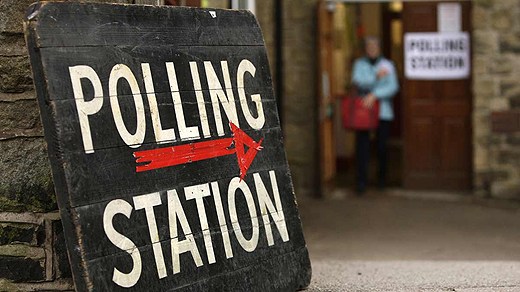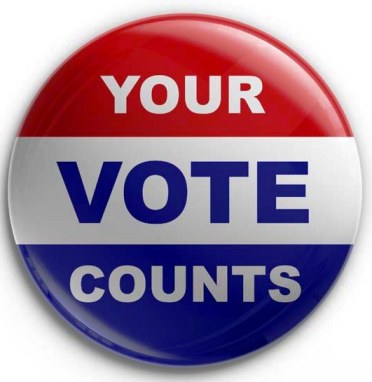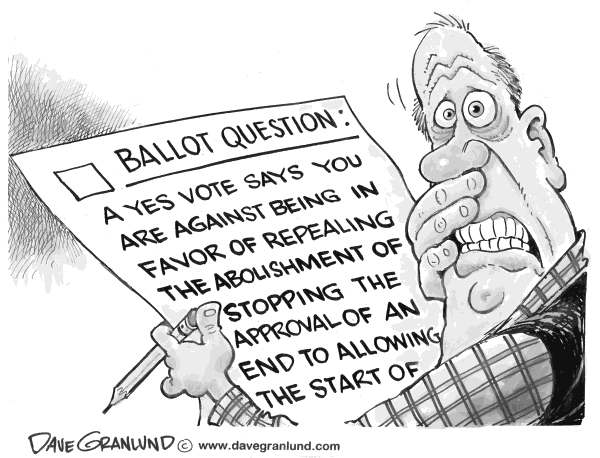
When I moved to college, I had an agreement with my parents. I would not switch my voter registration to my college town until my brother was out of high school. It seems like a funny thing to care about, but here’s why: the Presidential election isn’t the only election counts. In fact, there are other elections that hold way more sway over the average person’s life. In the case of my little brother, the school board election had a direct impact on his day to day, and even his future. Decisions made about our education system begin on a local level, even if they’re impacted by state and federal politics. And there are a fuck ton of other decisions that your local politicians are directly responsible also. So with the upcoming U.S. Presidential election getting All The Press And Attention, here’s a few reasons why you shouldn’t let your local election go unnoticed.
Your Vote Counts More
Picture your vote as a marble. In our current American (flawed) two party system, your vote is probably either a red marble or a blue marble. Mine’s a blue marble, if you couldn’t tell. Let’s pretend that when you vote, your marble gets dropped into a bag with all the other marbles from all the other voters. In the 2008 Presidential Election, your marble would be in a bag with 132,618,580 other marbles. That’s a boat load of marbles. In my home town, the population is 4,581. Now I’m not sure the ages of that population, but let’s assume the worst statistic: let’s pretend every person living in my home town is of voting age. My marble is now in a bag with only 4,581 other marbles. Let’s pretend that by some miracle of science the bags weigh the same (this makes sense in my head, because local elections and presidential elections are the same amount of really important.) Where is your vote going to represent more weight? Where it is 1/132,618,580 or where it’s 1/4,581? Catch my drift? Your vote means more in a local election just because math.

Your Planning Board Can Knock Your Ish Down
Ever heard of a planning board? Neither had I, until they planned to allow developers to pave over the wetlands behind my parents’ house. City and County-wide planning boards are responsible for decisions regarding the physical development of your environment. They have impacts on things like whether or not your neighbor can build a 12 car garage and run a garbage dump in his backyard (and therefore in yours,) or preserving farmland. And yes, whether or not developers should be encouraged to pave over protected nature.
Your Town Council Actually Does a Thing…
The town council and the mayor were actually the ones that put a stop to the destruction of the wetlands. And according to the website, Flemington’s town council is also responsible for things like Historic Preservation, Codes, Zoning, Fire Safety, Animal Control, Sewers and Sanitation, and Community Economic Development. To get a well rounded picture, I also looked up Pelham, New York and Springfield, Illinois, which also contributed Library Board, Town Memorials, Water Management in the case of drought, High Speed Railways, and Police Departments. Plus, your town council people are also super accessible to you. You will probably never get to share your feelings with President Obama about healthcare, but you can bring your dirty tap water to a town council meeting in a mason jar to prove that a construction company is out of line (this is a thing that has happened in my presence at a town council meeting). Other people that do things can include your sheriff, who is generally responsible for training police officers and enforcing laws. This can be a big deal for the queer community! You want a sheriff in power who, say, understands hate crimes or trans* issues because they’re going to responsible for imparting that culture to your police department.
…and So Do Ballot Questions.
Ballot questions are specific issues to be voted on, not candidates. Some are state-wide: for instance, Maine is voting on whether or not to overturn a ban on gay marriage, which is Really Important. Some are county-wide and often have to do with fundings for school districts (which kind of ties in with the next point, see below.) Either way, sometimes the way that ballot questions are worded can be confusing and they often require a little research. Luckily, if you are registered to vote, you will get a sample ballot in the mail so you can basically practice. You can also stop by Ballotpedia to get a list of ballot questions by state.

It Takes a Village and a School Board to Raise a Child
Perhaps you are a queer with children, perhaps you are not. Either way, these humans in your local school are going to be running things some day. And in my hometown, the school board / superintendent have tried to do away with school librarians. Think about the scary, scary world we would have if people didn’t know how to research. School Boards also approve curriculum, meaning your school board is directly responsible for whether attendees know gay people exist. And School Boards are all decided in local elections. And finally…








Comments
Great post! I’m a local political organizer and love to see people respect us down ballot folk. Take a look at the composition of these municipal boards and you’ll also notice that they are quite often as much as 75% male dominated. The old boys network is very much alive and well on these boards. All it takes is someone smarter than the rest of them to stir up some serious shit! The point about actually being able to talk to these representatives is important. States like mine, Maine, are small enough that we have a MUCH more responsive government at the state level, too. Many of our local candidates to the state house will end up knocking on every single door in their district in order to get elected. And of course, the most effective way to see meaningful and lasting change is to do it on a community level.
Your VAG posts make me want to be a better/more involved person!
I usually panic on election night because I have no idea who the local candidates are. Now I’ll have time to do research!
My biggest problem with local elections where I’m from is the ambiguity of candidates on issues. There’s never enough information out there on the policy of those running other than the record of the incumbent, either online from fact checkers or the candidates distributed info. And with the economy the focal point, no one seems to have anything to say about contributing social issues, from education to LGBT equality.
Yeah, it can definitely be a lot harder to find information about the local elections and where the candidates stand on issues
One argument for voting in your college town: In cities that have a lot of out-of-state college students (like Boston, where I am), the fact that so many students vote out-of-state makes the local politicians feel less accountable to the student population.
Hopefully the closeness and importance of the Elizabeth Warren/Scott Brown race this year will get more Boston college students to switch their voter registration to Massachusetts; I ultimately decided to do it because that race is much closer than Maryland’s marriage equality campaign (as importance as that it is to me), and because I’m really really worried about the Democrats losing the Senate.
If you live in a state that uses tax levies to fund schools (like Ohio) it is so important to remember to vote! Where I live, teachers jobs depend on property tax levies…which obviously isn’t fair.
Also, it is super important to research the issues and and how they are worded. Sometimes the wording is confusing, and even if you understand the issue, it’s you have to double check if you want to say yes or no. For example, last year Ohio repealed senate bill 5, which a lot of people were against. When it was on the ballot, it confused a lot of people because they were against the bill, but they had to vote yes on the ballot to repeal it, and that seems wrong to people who are not careful readers. So read carefully! Haha
Yes! Vote! And bug all your friends to vote. I am a poll teller (one of the people who checks you in to vote), and it is very common for us to have less than 50% of the registered voters in our precinct come to vote. Especially if the election is local, not state or federal. This means that really important local issues are decided by a small minority of the populace – go vote and bring those numbers up!
I can’t really get into politics much to be honest (I don’t like the arguing and general nastiness that seems to accompany it) and I’ve never really paid attention to voting and related stuff. At my work, we have $2 deducted from our paycheck to support a PAC that works for credit unions’ interests (I work for a credit union), and I generally feel that is enough political involvement for me. But, that is just me,).
One other thing that is important: Make sure to read up on the judicial candidates! They often are non-partisan offices, so you can’t just vote straight ticket and assume if they’re more with your party they’ll represent your interests.
Lambda Legal put out a state-by-state guide to judicial nominees recently: http://www.lambdalegal.org/issues/fair-courts-project/2012-judicial-elections
Sidenote: Ali, we’re from the same area. Fun!
[…] http://develop.autostraddle.com/your-local-vag-voting-an-autostraddle-guide-on-why-local-elections-matte… […]